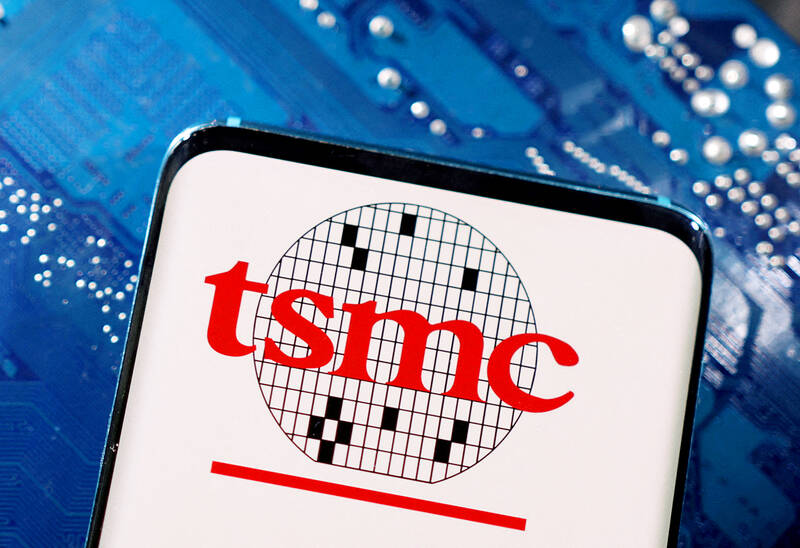Shares of contract chipmaker Taiwan Semiconductor Manufacturing Co (TSMC, 台積電) yesterday closed sharply higher, despite Berkshire Hathaway Inc announcing overnight that it had cut its holdings in the chipmaker to zero.
TSMC rose 1.92 percent to close at NT$505 on the Taiwan Stock Exchange, while the TAIEX closed up 198.85 points, or 1.28 percent, at 15,673.90, led by the bellwether electronics sector.
“Berkshire’s move to cut its holdings in TSMC to zero was widely anticipated after the investment firm sharply lowered its holdings in the company in the fourth quarter of last year,” Mega International Investment Services Corp (兆豐國際投顧) analyst Alex Huang (黃國偉) said.

Photo: Reuters
In a 13F filing, which discloses investment firms’ portfolios, with the US Securities and Exchange Commission on Monday, Berkshire said it had offloaded the remaining TSMC shares it owned.
A previous filing in February showed that Berkshire had cut its holdings in TSMC’s American depositary receipts (ADRs) by 86 percent from the third quarter of last year to about 8.3 million units in the fourth quarter.
The disposal of the large chunk of ADRs caught observers off guard because Berkshire chairman Warren Buffett has been considered a long-term investor.
In an annual general meeting held by Berkshire Hathaway early this month, Buffet said that he sold his TSMC holdings because of concerns over geopolitical risks.
“Taiwan Semiconductor is one of the best-managed companies and important companies in the world, and you’ll be able to say the same thing five, 10 or 20 years from now,” Buffett said. “I don’t like its location and re-evaluated that.”
He said there was nobody in the chip industry in TSMC’s league and called it a “marvelous company” with “marvelous people,” but said he would rather find the same kind of company in the US.
“I feel better about the capital that we’ve got deployed in Japan than in Taiwan,” he said. “I wish it weren’t so, but I think that’s the reality.”
Huang said that geopolitical concerns do not dictate the strategies of every institutional investor and that many primarily consider a company’s fundamentals.
“For me, the real concerns are whether TSMC’s sales will rebound in the third quarter as the market expects,” he said.
TSMC said at an investor conference last month that its revenue would fall 1 to 6 percent from a year earlier in US dollar terms, a downgrade from an estimate in January of “a slight increase” because of greater caution over the market outlook for this year.
International business wires reported that foreign institutional investors such as Macquarie Capital Ltd, Fidelity Investments Inc, Tiger Global Management LLC and Coatue Management LLC have raised their holdings in the Taiwanese chipmaker.
Macquarie added about 78 million units of TSMC ADRs to increase its holdings in the first quarter to about US$7.3 billion, while Fidelity bought 14.1 million new TSMC ADRs, increasing its investment in the chipmaker to almost US$4 billion, the reports said.
Tiger Global acquired US$147.8 million of TSMC ADRs in the first quarter, while Coatue built a new position in the chipmaker, buying 5.9 million shares for US$548.9 million, the reports said.

The US dollar was trading at NT$29.7 at 10am today on the Taipei Foreign Exchange, as the New Taiwan dollar gained NT$1.364 from the previous close last week. The NT dollar continued to rise today, after surging 3.07 percent on Friday. After opening at NT$30.91, the NT dollar gained more than NT$1 in just 15 minutes, briefly passing the NT$30 mark. Before the US Department of the Treasury's semi-annual currency report came out, expectations that the NT dollar would keep rising were already building. The NT dollar on Friday closed at NT$31.064, up by NT$0.953 — a 3.07 percent single-day gain. Today,

‘SHORT TERM’: The local currency would likely remain strong in the near term, driven by anticipated US trade pressure, capital inflows and expectations of a US Fed rate cut The US dollar is expected to fall below NT$30 in the near term, as traders anticipate increased pressure from Washington for Taiwan to allow the New Taiwan dollar to appreciate, Cathay United Bank (國泰世華銀行) chief economist Lin Chi-chao (林啟超) said. Following a sharp drop in the greenback against the NT dollar on Friday, Lin told the Central News Agency that the local currency is likely to remain strong in the short term, driven in part by market psychology surrounding anticipated US policy pressure. On Friday, the US dollar fell NT$0.953, or 3.07 percent, closing at NT$31.064 — its lowest level since Jan.

The New Taiwan dollar and Taiwanese stocks surged on signs that trade tensions between the world’s top two economies might start easing and as US tech earnings boosted the outlook of the nation’s semiconductor exports. The NT dollar strengthened as much as 3.8 percent versus the US dollar to 30.815, the biggest intraday gain since January 2011, closing at NT$31.064. The benchmark TAIEX jumped 2.73 percent to outperform the region’s equity gauges. Outlook for global trade improved after China said it is assessing possible trade talks with the US, providing a boost for the nation’s currency and shares. As the NT dollar

The Financial Supervisory Commission (FSC) yesterday met with some of the nation’s largest insurance companies as a skyrocketing New Taiwan dollar piles pressure on their hundreds of billions of dollars in US bond investments. The commission has asked some life insurance firms, among the biggest Asian holders of US debt, to discuss how the rapidly strengthening NT dollar has impacted their operations, people familiar with the matter said. The meeting took place as the NT dollar jumped as much as 5 percent yesterday, its biggest intraday gain in more than three decades. The local currency surged as exporters rushed to